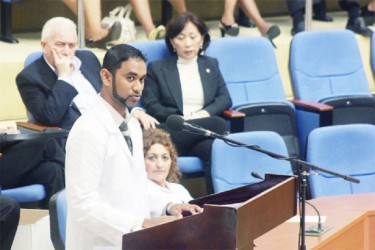The Health Ministry is hoping to boost the quality of healthcare available by assigning over 300 newly-graduated Cuba-trained doctors with experienced medical personnel at public institutions countrywide.
At a graduation ceremony held for 70 of the doctors at the Guyana International Conference Centre, at Lilendaal, Health Minister Dr. Bheri Ramsaran, President Donald Ramotar and Cuban Ambassador to Guyana Raul Marrero charged them to continue to enhance their knowledge and qualifications.
“These are baby doctors. We will be holding their hands and guiding them… they will be attached with experience doctors and will continue their preparations. Then when we are satisfied… they will get additional certification before they go,” Ramsaran told attendees.
The group returned to Guyana earlier this month to commence working after training in Cuba for over six years. The other 230 doctors already graduated in Cuba prior to their return.
Ramsaran said that it is the aim of his Ministry that health services are available to every person without bias and he charged graduates to not discriminate when offering treatment. “The woman in Leguan needs the same treatment as the woman on the East Coast or in the city,” he said.
Later, Ramsaran told Stabroek News that the logistical division of doctors has already been worked out and that “very shortly” the doctors will be notified about placements. “Well, only today is the graduation so we have not told them anything yet but it is worked out. The math has been done… they go on leave and when they finish all their paperwork they will know,” he said.

Asked whether there were enough experienced mentors for the large number of graduates, he said that the new graduate per experienced doctor ratio was “manageable” and will work. He added that help will also be given by organisations, such as the Pan American Health Organisat
ion (PAHO), so that the doctors’ youthful energies will be channeled positively, bringing development to them and by extension the healthcare system.
The Health Minister also thanked Cuba for the assistance to Guyana’s healthcare system but stressed the limitations that country has given that it is still embargoed. As such, he said Guyana realises that it should begin to “paddle its own canoe” and he hoped that with the training received local doctors will be less dependent on Cuba.
This was echoed by President Ramotar, who in his address to the graduates said that human resource development was key to the country’s enhancement. “For our country to develop, it is not only the natural resources or the other resources…for our government, the most important development is the quality of people that we have,” he said.
He pointed to developed countries showing the relationship between an educated populace and their economic development. As a result, he said he places emphasis on developing the human capital as evidenced by the over 30% of the national budget going towards developing human capital.
Ramotar also told the graduates that their secondments to areas sometimes unknown might not be all they expect but added that they should look to it as their giving back to a country that gave them the opportunity to study. From the experience of his own wife, First Lady Deolatchmie Ramotar, who worked as nurse at locations throughout Guyana and whom he met while she was stationed at Bartica, he told them to expect and welcome life changing events.
Further, he charged the group to be role models for other youths as many are hooked on drugs or have turned to a life or crime, thus burdening the country’s development. Said Ramotar: “I believe that if you as doctors can be an example to our young people, to get them to see what they can do, if they are aware then we can bring down the numbers … you can be a major contributor in that fight.”
Calling yesterday “a day of rejoicing and triumph for Cuba and Guyana and deep satisfaction,” the Cuban Ambassador Marrero told the graduates that with an ever advancing world of medicine where there are new products every day, they should keep abreast of developments. “A doctor should never feel satisfied with this knowledge… it is essential that each one of you take many hours studying to stay updated and be doctors who are respected because of their knowledge… Once you become aware of the role you have to play, studying becomes a necessity,” he said.
He told them that they should be loyal to their contract commitments, staying in Guyana to work and not seek money over helping their countrymen. “You are part of a new generation of doctors… Guyana requires professionals who are fully equipped with knowledge of the country’s problem and are willing to help,” Marrero said.
Graduates, meanwhile, expressed joy at being home as they reflected on the grueling six years on the Spanish speaking island. They said that Ministry of Health officials have notified them that on Tuesday they will be sorting out secondments and paperwork and they hope that by October they will be practicing with guidance.
“It was not easy and it sounds cliché but it wasn’t … we did our studies at Calixto [Hospital] or some at Albarran in Havana and the language barrier, at first, was frustrating. That’s why they dedicate one year just to learn the language. Through the tears and tons of studying we are here and are grateful,” one of the doctors said.
“I am glad of the mentorship offering because there is still much that so much of us fully have not grasped. But as they say, ‘Rome was not built in a day,’” he added.
His grandmother, who interrupted his interview with Stabroek News, said: “They have to get plenty training still… You think me go guh to he if me sick now? No lil boy like a dis can’t treat me… experience is everything. They better put them to learn with some good old doctors. ”




